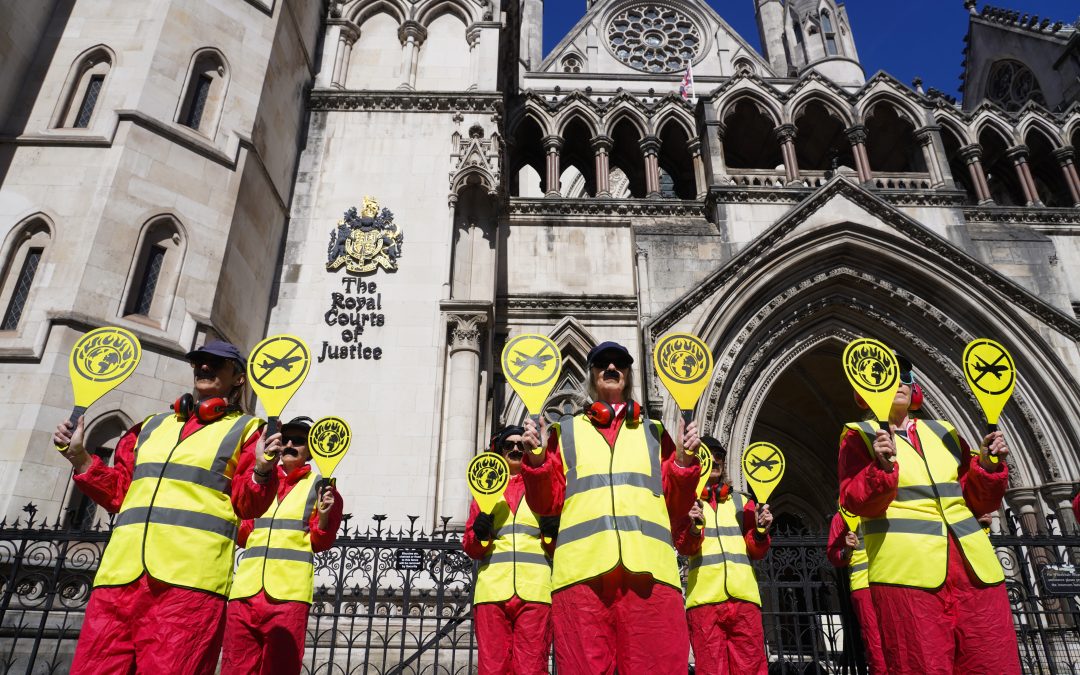Contacts:
Sara Mingorria (EnvJustice, ICTA-UAB)
Email: [email protected]
Phone: +34676335412
Rose Bridger, Stay Grounded (Stay Grounded)
Email: [email protected]
Phone: +44 7779 137522
Barcelona/London, 23 July: The EnvJustice project of the Environmental Science and Technology Institute at the Universitat Autònoma de Barcelona (Autonomous University of Barcelona) ICTA-UAB and the Stay Grounded network have registered more than 300 socio-environmental conflicts related to the expansion or creation of new airports or aerotropolis (airports surrounded by industrial and commercial zones). 60 of these have been analyzed and are included in this map.
Some of these conflicts began in the 1970s (such as Guadalajara, México), but the majority started since 2010 when the expansion and creation of new airports around the world accelerated. The cases are located as much in the Global South as in the North, and are just as likely in urban areas as in rural ones. More than 50% of the cases are found in Asia and almost 20% in Europe.
Most of these conflicts are caused by the expansion of aviation infrastructure, “justified” through discourses on development such as the construction of airports after a natural disaster (eg. Barbuda), the growth of the economy, tourism (eg. Costa Rica), or improving security (eg. a new airport for passenger flights and defense purposes in Pakyong, India). New airports and expansion of existing airports are shown on the map, focusing on military defense, passengers and/or commerce; as well as infrastructures for the transport and storage of kerosene, and aerotropolis projects (airport cities) which are airports surrounded by facilities aimed at tourists such as shopping malls along with industries that depend on aviation.
Showcasing negative impacts of airport projects
Airport projects have resulted in forced evictions, dispossession of land (examples include Obudu Airport, Nigeria and Yogkyakarta, Indonesia), destruction of high biodiversity ecosystems such as mangroves, wetlands or dense forests (Atenco, México), destruction of sacred sites and areas of high cultural value (Kerala, India), and grave damage to the health of people and nature caused by chemical and noise pollution (Vienna, Austria). One of the most serious cases of deforestation in Sri Lanka occurred in the area where the Mattala Airport was later built. Another project that threatens large scale deforestation is construction of an airport in Mopa, India. In addition, conflicts do not only occur because of the construction of the airport, but also because of extraction and transport of materials needed for aviation to function, such as the large quantities of land, pipelines and tanks to store kerosene (Vanouver, Canadá). The cases of Komo Airport in Papua New Guinea and the airport in Gautam Buddha, Nepal demonstrate conflicts related to the extraction of sand and gravel for construction of airports. Mangroves in Manila Bay have already been destroyed for construction of Bulacan Aerotropolis in the Philippines and coral reefs and seabed may be at risk due to a proposed second airport on the island of Tioman, Malaysia.
The construction of airports also has serious impacts on the environment and health of people who live close by. Residents living in the midst of earthworks have suffered from accidents caused by falling rocks during construction work (eg. Navi Mumbai). Once airports are in operation, neighboring communities are at risk from illnesses related to high exposure to pollutants emitted by aircraft and noise.
Resistance against injustices
However, these injustices are being denounced and protested by environmental and social justice movements. Locally, fisherfolk, peasants, and urban citizens, and globally, climate justice groups have achieved big and small victories: they have stopped, suspended or re-located infrastructure projects; increased compensation; or reduced the negative effects on the most affected communities. In 40% of the cases, the movements have achieved at least one of these victories, and of these, 80% are cases where mobilization began before the construction of the infrastructure, in other words, mobilization that has tried to prevent the injustice and its impacts. Often governments and companies use compensation mechanisms to demobilize the opposition to these infrastructure projects, however in some cases these have been considered a victory by affected people and movements supporting them.
Partial victories for environmental justice
New airports have been successfully halted because they threatened the destruction of farmland in Nantes, France, or wetlands in Texcoco in Atenco, Mexico. But often these stoppages are only temporary and do not mean the end of a conflict. Projects are usually suspended only temporarily or are relocated elsewhere. Similarly, projects have occasionally ceased after they have already created serious environmental and social impacts, such as was the case of an airport on the island of Koh Phangan, Thailand, that was stopped after the forest was illegally logged.
In terms of partial victories, movements have achieved compensation for land acquisition such as in Bhogapuram, India. There have also been judicial decisions in favor of the affected population. For example, in Ekiti, Nigeria, where local people were illegally evicted, the court ordered the payment of the damage caused.
Mapping as tool to strengthen connections between movements
The majority of these struggles and environmental and social resistances have been repressed by states through forced evictions, harassment, intimidation, arrests, imprisonment and violence, as almost 80% of the registered cases demonstrate. Among these cases, suicides of people who have faced eviction because of airport projects have also been documented. The mapping project of airport conflicts serves as a tool to strengthen the connection between affected groups and environmental, social and climate justice movements.
New alliances of resistance against Barcelona airport
There are also conflicts related to airports in Barcelona (although these are not yet included in the Ejatlas). Residents in Castelldefels, El Prat and Gavà have been protesting against noise pollution and for the right to health for more than 13 years. In a common struggle, local and global movements for environmental and social justice are coordinating to confront this new threat that will further increase tourism, noise, pollution and global warming in the city of Barcelona. Through the organization of the conference that took place on 12 – 14 July in Can Batlló (Barcelona), the network of resistance against the new project to expand the Prat – Girona airport is being strengthened. This resistance connects the Stay Grounded network, with local movements and groups that oppose mass tourism and are for climate justice, platforms for the right to housing, environmental justice and urban feminist organizations, and groups affected by the current El Prat airport.
Background Information
Mapping Project
The mapping on airport conflicts is a project in development coordinated by the EnvJustice (ICTA-UAB) project and the Stay Grounded network. The information gathered has been provided by organizations, local collectives and academics. The research team is coordinated by Rose Bridger (Stay Grounded) and Sara Mingorria (ICTA-UAB).
This already substantial database on the socio-environmental conflicts related to airports is part of a global inventory of socio-environmental conflicts around the world (Ejatlas- https://ejatlas.org), that was created in 2012. As of 11 July 2019, 2831 cases have been registered, globally, and thanks to the funding from the project EnvJustice (http://www.envjustice.org), it will reach 3000 cases in December 2019. Although not an exhaustive count Ejatlas is the biggest inventory of environmental conflicts in the world.
EJatlas
EJatlas is an online database and interactive map documenting and cataloguing environmental conflict around the world.
Website http://ejatlas.org/
Facebook https://www.facebook.com/ejolt/
Twitter @EnvJustice
Stay Grounded
Stay Grounded is a global network to build a socially just and ecologically sound transport system and to rapidly reduce aviation. Almost 200 groups and organizations from all continents support its positions, more than 130 of them are active members.
Website https://dev.stay-grounded.org/
Facebook https://www.facebook.com/StayGroundedNetwork
Twitter @Staygrounded3



